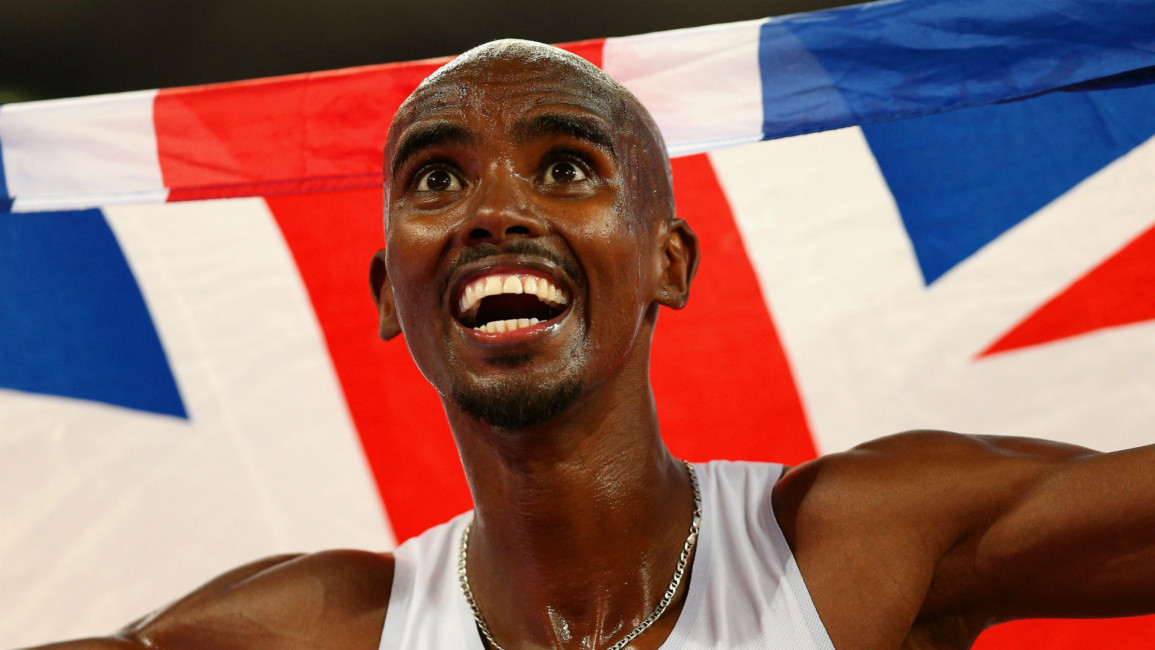
Britain's greatest athlete - a Muslim called Mohamed
Sir Mohamed "Mo" Farah finished his track career this year as not only Britain's best ever athlete, but also as one of the greatest distance runners of all time.
A quick look at his stats shows why. Farah has won 30 international medals, 19 of which are gold. The 34-year-old is the first athlete in history to win 10 consecutive world distance track titles and is a four-time Olympic champion, six-time World Champion and five-time European champion.
The Londoner has now started the next chapter of his career as a road racer. And with that comes the request to be called by the entirety of his first name - Mohamed. Having cemented his status in history, Farah feels comfortable in asking the British public to finally call him by his full name.
Early years
Farah spoke little English when he arrived in West London from war-torn Somalia at the age of eight. It was his PE teacher that first saw potential when Farah started running for the school.
He had a promising junior career but struggled to make an impact when he stepped up to the senior level.
Despite winning the European Championships in 2006, a disappointing performance in the 2008 Olympics forced him to strive for better. He hired world-class coaches, used state-of-the-art facilities and lived and trained with elite Kenyan and Ethiopian athletes at altitude.
It paid dividends. In 2011, Farah won his first major title in the World Championships in Daegu, South Korea. He took gold in the 5,000m and was pipped on the line, having to settle for silver, in the 10,000m.
London 2012
But it was London 2012 that catapulted Farah to the public's conscience.
Twitter Post
|
With his reputation in the sport on the rise, and the public's focus turning to the Olympics, expectations were high. Farah was under pressure to deliver - and he delivered in style.
Farah was the closing chapter of Super Saturday - the day Team GB won 12 gold medals. The day ended with Great Britain taking three golds inside an hour in the cauldron of the Olympic Stadium, with Farah winning the 10,000m moments after the successes of team-mates Jessica Ennis and Greg Rutherfood.
Farah's place in British sporting greatness was confirmed when he completed the double by winning the 5,000m a week later. BBC commentator Brendon Foster called it "the greatest single moment in British athletic history".
It cannot be overstated how much London 2012, and in particular Farah, enchanted the public. On YouTube you can watch people recording themselves cheering on Farah during the Games.
It's not just his sporting prowess that turned him into a British hero. His affable demeanour, infectious smile, and famed "mobot" salute and sujood (prostration to God) celebrations all played a part in endearing him to the public.
Controversies
But despite the public adulation and success on the track, Farah's still not received the level of recognition someone of his stature rightly deserves.
Whispers surrounding his controversial coach Alberto Salazar, the subject of a US Anti-Doping Agency investigation, engulfed Farah. Farah himself has never failed a drugs test and in a recent press conference accused the media of trying to "destroy" his reputation.
Neither has he been properly recognised by the BBC Sports Personality of the Year electorate. Despite his clear popularity and unparalleled success over the past seven years, many believe it's a national embarrassment that the public has never voted for him to win the award.
The uncomfortable truth is, some people still find it difficult to fully accept a British black, Muslim, immigrant of Somali descent.
It shows Britain still has quite a way to go before it truly accepts and celebrates its diverse citizens. The continued success of athletes like Farah will ensure that process happens sooner.
But Britain does have much of which to be proud. Farah was an immigrant. He learned his craft in Hounslow, not Mogadishu. It's the support and encouragement he received here that made him a world-beating athlete.
And it's the reason why Britain's greatest ever athlete is a black, Muslim immigrant called Mohamed.
Jamil Hussein is a freelance journalist covering sport, politics, current affairs, lifestyle and culture.
Follow him on Twitter: @jam1lH




